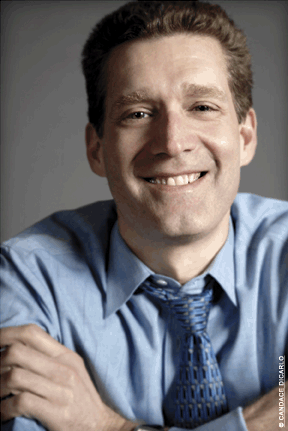
Coming from a family of limited means, “a place like Penn was beyond my reach,” Bob Alig C’84 WG’87 explained recently. “Were it not for the remarkable support I received—financial-aid and otherwise—this simply would not have been a realistic alternative for me in 1980, when I enrolled as a freshman.”
That thoughtful observation helps explain why Alig, who has served as assistant vice president for alumni relations over the past six years, recently decided—with very mixed emotions—to accept an executive position with the College Board.
His new position as that organization’s vice president for the middle-states region is not just a “chance for me to test my wings and grow,” Alig pointed out in an interview late in January, a few weeks before his last day on the job. It’s also an opportunity to work in an area that he cares “very, very deeply about”—and which happens to be central to Penn’s goals as well. Though best known for administering standardized tests, the College Board’s overall mission is “providing access and equity for higher education,” he explained, “to enable more students and more diverse students to be successful in college.”
Alig’s time at Penn came in three six-year stints: first as a student, earning his undergraduate degree in history and then his MBA; next, working for the Wharton School, primarily in MBA Admissions; and finally serving as head of alumni relations from 2001 until last month.
Despite this “interesting symmetry,” Alig described himself as “conflicted” about his decision to move on: “I’m leaving a place that I love and work that I’m passionate about, and an absolutely terrific group of colleagues, and I feel that the progress we have made in alumni relations is reflective of Penn’s overall momentum over the last decade.
“If I’ve brought anything to this position, it has been passion, and a love for this University,” he added. “All the other indices, metrics, accomplishments, really don’t matter.”
Penn President Amy Gutmann cited Alig’s “passion for all things Penn,” along with the “unflagging energy with which he has translated that passion into innovative programs that connect alumni ever closer to the intellectual and social life of their alma mater” as reasons he will be “mightily missed, not least by me.”
She credited Alig in particular with “rethinking” Homecoming and Alumni Weekends to attract wider audiences to campus, and called him a “consummate perfectionist” who takes great pride in his work. “He has never hesitated to get right down in the trenches with his staff or to take on any task,” she said, “whether stuffing envelopes, welcoming alumni to an event, rearranging centerpieces, or tracking down an obscure piece of information.”
In announcing Alig’s resignation, John Zeller, vice president for development and alumni relations, called him “a valued colleague and friend” and cited the “wonderful work” accomplished in alumni relations under his leadership, including “the growth in programming both on and off campus, the increase in attendance at Homecoming and Alumni Weekend, the significant growth in alumni engagement through the creation of many new Alumni Clubs around the world, and the online community.”
Looking back over his years heading alumni relations (which included serving as publisher of the Gazette), Alig talked about his pride in the “caliber of the alumni-relations staff” and also praised the “constant” commitment and advocacy of Penn’s volunteers and the University’s trustees—in particular, Paul Williams W’67, who has served as Penn Alumni president since 2003. Alig referred to Williams as “an absolute partner in all of the progress” achieved, as well as a personal “mentor, coach, advocate.”
“The affection, the admiration, the respect I have for my colleagues, and the indebtedness I feel to Paul Williams are huge,” he added.
For his part, Williams called Alig a “tremendous guide and colleague” in helping him navigate his role as alumni volunteer leader, and someone whose “love and commitment to Penn is very special, manifest in many ways, and extends back to the day he came East to campus as a freshman from Dayton, Ohio.” After echoing Zeller’s comments on Alig’s key accomplishments, Williams singled out his “special commitment to the diversity of Penn alumni and quality content-driven programming” as a particular legacy of his tenure. He praised Alig’s determination to advance Penn as the intellectual home of alumni, his sensitivity to diversity issues, and his “desire to bring people together with a common red-and-blue thread.”
“Alumni see Penn as their intellectual home, but everyone’s connection to the University is shaped” by their own experience, Alig said. For each individual, it “might be affiliation with a particular group, a faculty member, an extracurricular activity, sports, or a fraternity,” that makes Penn special. “Our programming, support, and outreach should reflect the remarkable diversity that has become the hallmark of Penn.”
Another focus has been on achieving closer integration between alumni relations and development efforts, he added, which has helped lay the “foundation of a very, very successful public launch” of Penn’s planned capital campaign. Related to that, a new strategic plan for alumni relations has been crafted that will similarly strive to better integrate alumni activities across all of Penn’s 12 schools and centers.
Alig estimates that the AR staff has grown about 20 percent during his tenure, and is slated to increase further as the campaign gets under way. “The critical challenge is not going to be simply to add staff or resources to alumni relations, but to build on the strength of efforts that are successfully under way across the schools and centers at Penn,” he said.
It’s hoped that a new assistant vice president of alumni relations will be on board by Alumni Weekend or, more likely, sometime over the summer; a search is currently under way. —J.P.

